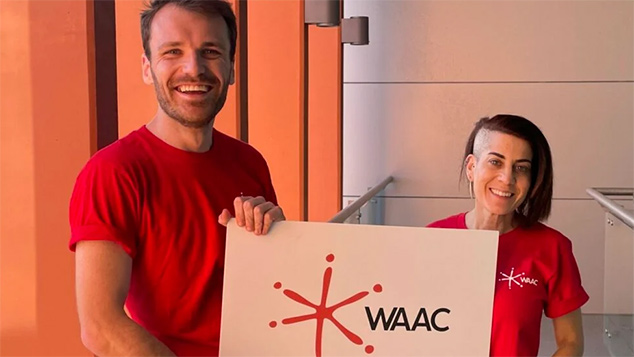
Conrad Liveris is the new chair of WAAC, replacing Asanka Gunesekera who has stepped down after many years leading the health organisation.
Recently rebranded as just WAAC, the former WA AIDS Council is ready to take on it’s next set of challenges with a fresh strategic plan and a new leadership team taking up the reins. Chief Executive Lisa Dobrin (pictured above) joined the organisation 18-months ago, and Liveris is moving into the chair position having previously been the organisation’s secretary.
Speaking to Tom Reynolds on RTRFM’s All Things Queer the new chair said the decision to rename and rebrand the organisation made a lot of sense.
“It’s something that had been in the works for a while, people had requested a name change. The HIV and AIDS experience has changed, the epidemiology and medical and changed, and AIDS as a word on it’s own – rather than an acronym – comes with a fair bit of stigma and assumptions.” Liveris said.
Explaining that the consultation and discussion around the rebranding and name change had taken several years, Liveris said it’s launch last month was perfectly timed to occur at the same time as the organisation embraces a new strategic plan to guide it through the next few years.
Liveris, who studied economics and has become one of Australia’s most sought after commentators on workplace trends and gender equality, has a significant background in the non-for-profit sector. He previously founded an organisation that aimed to increase awareness around homelessness, and has worked to make affordable legal services more available to people.
He said joining the WAAC board was an easy decision because of the great work the organsiation has done over many decades.
“I had some time on my hands, I had the capacity and knew I could make a contribution.” Liveris said of his decision to accept a position of the board, but his interaction with WAAC began back when he was a teenager in high school.
“We had a community educator from WAAC come through one of our health classes to talk about living with HIV and sexual health more broadly. It still sits with me as one of the most powerful experiences of my entire schooling education. It hangs on my mind a lot, it went for an hour, but outside of the formal education of English, math, science and things like that, as a guest in our classroom WAAC made a huge difference.”
Liveris noted that over the years the organisation has grown considerably a has a large footprint including counseling services, education, support for people who use drugs and many other services, while at the same time the medical options for people living with HIV had been transformed.
In a message to stakeholders Liveris reiterated that the organisation was cognisant that the LGBTIQA+ community had been been the drivers of their success in the past, while at the same time the demographics about who was most effected by the virus was changing.
“The HIV epidemic is different in WA than in other states. We see more HIV notifications amongst heterosexual people, Aboriginal people, and ethnically diverse people. However, it is the LGBTQIA+ community which has given us our energy, support and longevity as we enter our 35th year. I am fortunate to have had many successful and determined people lay the groundwork for many years so I can assume the role for WAAC at this time.” Liveris said.
“HIV transmissions still occur and I would encourage people to be vigilant, and still go and get regular sexual health tests.” Liveris told All Things Queer, sharing that he’d just completed the task himself.
“We know there’s a big problem with syphilis at the moment, there’s still gonorrhea, so being vigilant about sexual health generally is actually still a thing that we need to be conscious of…we do need to be on top of these things.” Liveris said.
OIP Staff, members of the OUTinPerth team volunteer at RTRFM to help create All Things Queer.
You can support our work by subscribing to our Patreon
or contributing to our GoFundMe campaign.






